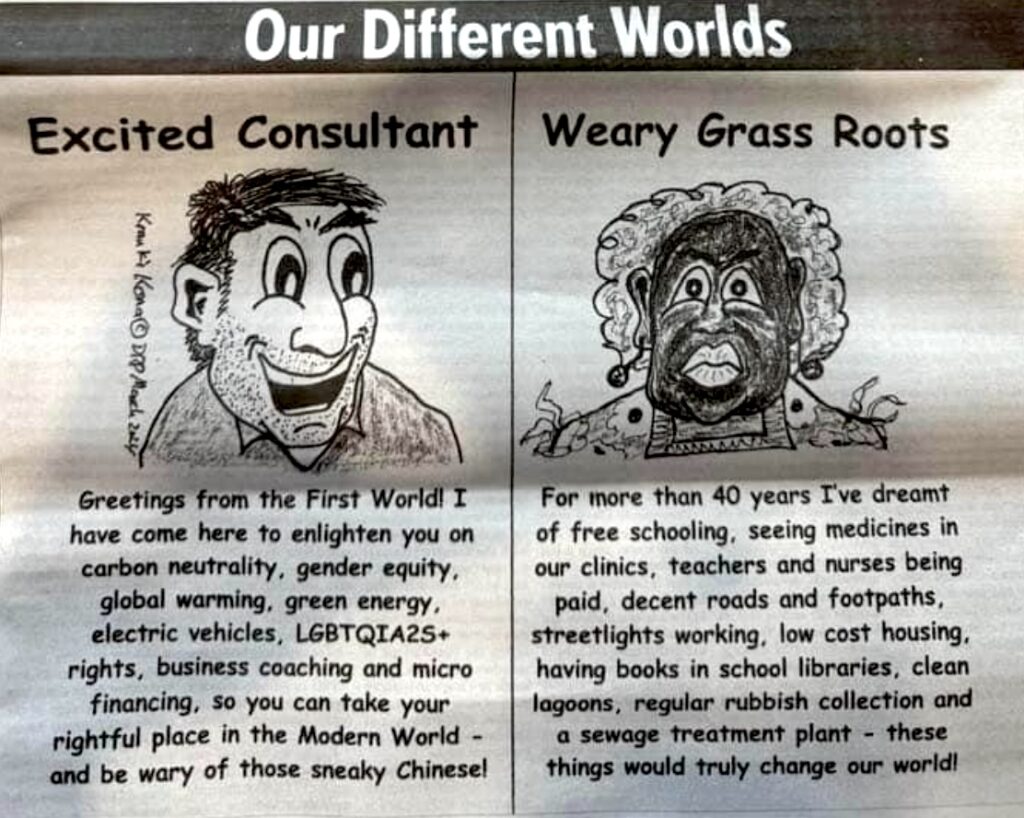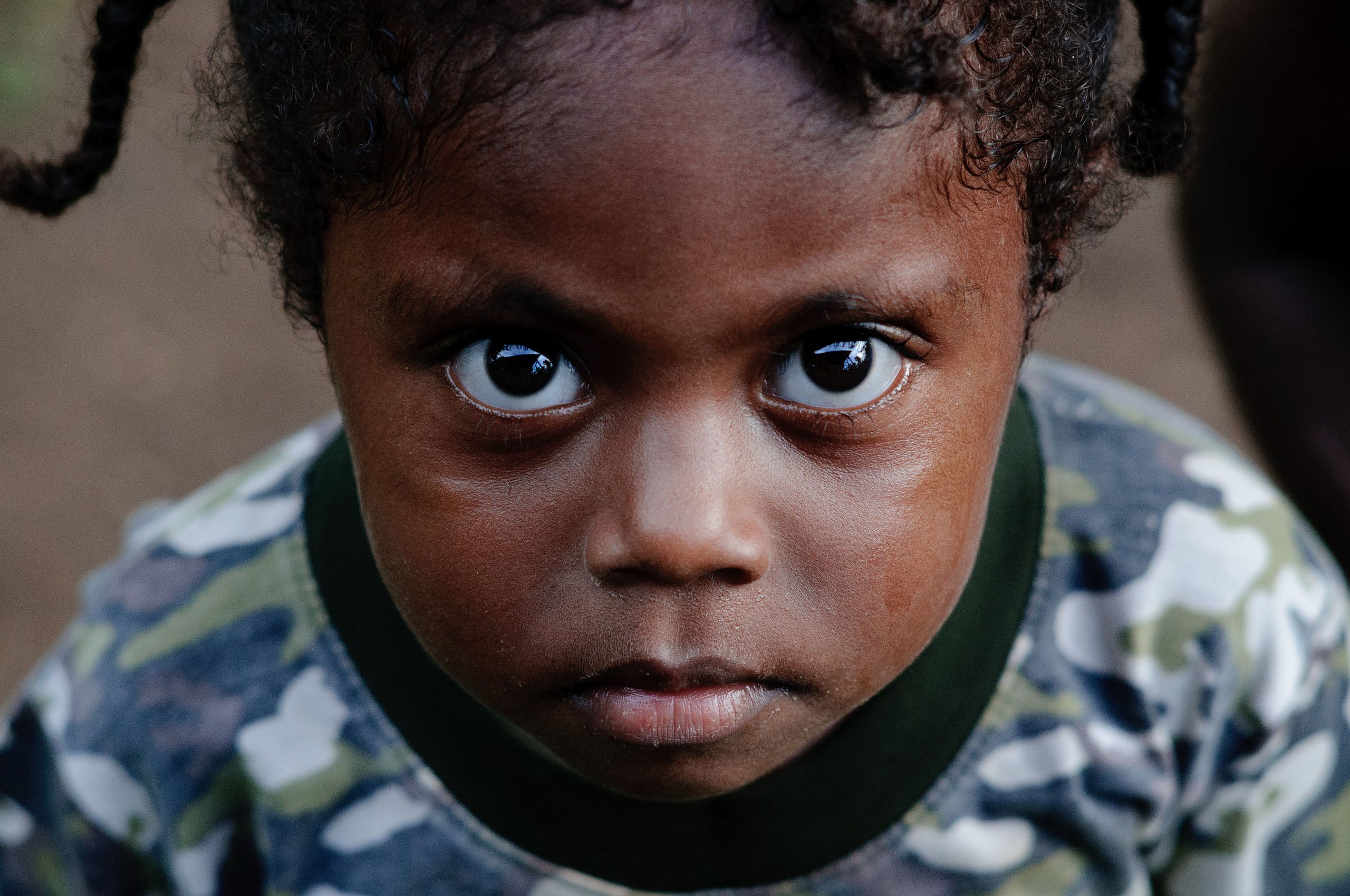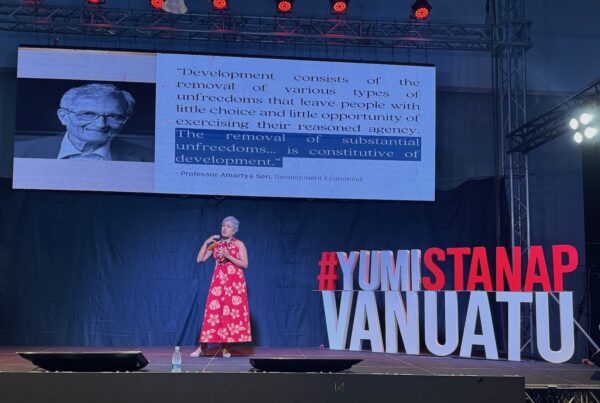By Martin St-Hilaire
Here’s an idea Vanuatu’s foreign sponsors won’t like: Let’s focus on treating our sewage and training our workers before addressing carbon neutrality or gender parity.
Whenever I speak with outside observers – global financial institutions, diplomatic corps, Non-Governmental Organisations (NGOs) – I dread the moment when they offer advice on how Vanuatu should develop.
More often than not, there comes a point in the discussion where they talk about green energy, diversity of sexual identity and orientations, Chinese competition, or other first-world problems that don’t appear on the list of priorities of a poor country where most people don’t even have power, renewable or otherwise.
For example, I recently heard that representatives of a global governance body were pressing Vanuatu car dealers to introduce electric vehicles. Do they even realize this is an archipelago? Or that it has huge power generation challenges?
Every time I hear such ignorance, I can only shake my head at the chasm between well-holstered Western meeting rooms and our humble structures.
First things first
The United Nations (UN) has established no less than 17 Sustainable Development Goals (SDGs), often quoted as the ideal roadmap for emerging countries. They are commendable but can we proceed in order of priority instead of trying to tackle all of them at once?
I suppose Zero Hunger, Good Health and Quality Education (SDG #2, #3 and #4) come before Gender Equality, Responsible Consumption and Climate Action (SDG #5, #12 and #13).
Solving the world’s problems is a lofty goal, but Maslow’s famous hierarchy of needs rests solidly on safety, health and employment with self-actualization at the pinnacle.
We can focus on climate change, recycling and gender issues only after we achieve basic health care, sufficient literacy, safe roads, and timely airport departures to name just a few pressing needs.

Reality check
While we should always be grateful for the support of the international community, we would benefit more from foreign aid if it wasn’t hampered by foreign “good ideas.”
Some of our overseas benefactors really need a reality check.
A first impression says it all: Our airport is getting worse by the day, with toilets overflowing, facilities in disrepair and long immigration lines. The joyous string band welcoming tourists is long gone.
In fact, Air Vanuatu has become so unreliable, I cannot fly it anymore. I haven’t travelled to Santo or Tanna for ages for fear of getting stranded there.
Our schools have few books if any, and lack furniture. Literacy is so low that very few young Ni-Van qualify for modern jobs.
The government hires most of them while others leave to build careers abroad.
This leaves the private sector with a tiny pool of potential hires who need extensive training before they can create value.
I’m not just talking about accountants, a position for which I’m currently hiring. As a developing economy, Vanuatu is in need of many essential trades such as plumbers, electricians, engineers, nurses, doctors, carpenters… you name it. We need more qualified workers in every profession.
We can always import skilled foreign workers but they’re more expensive, hard to convince to move here, and even harder to get approved by immigration.
We need to better educate our youth and grow our own human resources in order to diversify our economy and build long-term prosperity.
Nothing highlights inequity like a serious ailment. The most privileged among us can fly to New Caledonia for treatment, but many of our poorer citizens don’t even have access to basic healthcare. Every sovereign country should have sovereign health care.
It’s all about priorities
Every time our foreign advisors try to “raise awareness” about some worthy goal, they’re just making noise and diverting precious resources. Their money, our time and our leaders’ attention would be better served by ensuring a clean, functional society.
Fighting CO2 emissions from power generation and personal vehicles is pointless in a country where everyone burns wood to cook.
Instead, let’s focus on things like building wastewater treatment capacity or stocking the bookshelves in our schools. They do nothing for climate justice or racial equity but they go a long way to removing fecal matter from our lagoons and building the next generation of qualified workers.
It’s time to focus less on out-of-touch foreign priorities and more on our own.





